External links
- Thomas Szczeponik in the German National Library catalogue
| Party political offices | ||
|---|---|---|
| Preceded by | Chairman of the Katholische Volkspartei 1922–1927 | Succeeded by Eduard Pant |
Thomas Szczeponik (born 4 December 1860 in Peiskretscham, Province of Silesia (now Poland), died 30 January 1927 in Katowice (Kattowitz)) was a German-Polish Catholic politician.
He was educated as a teacher at a Catholic seminary in Peiskretscham between 1874 and 1881, and worked as a teacher. He was elected to the Weimar National Assembly in 1919 as a representative of the Catholic Centre Party, and was a member of the German Reichstag until 31 August 1922. In 1920, he voted against the ratification of the Treaty of Versailles. After his hometown became Polish, and he became a Polish citizen, he left the Parliament of Germany in 1922.
After becoming a Polish citizen, he founded the Katholische Volkspartei, a Catholic party that promoted the interests of the German minority in Upper Silesia. He was a Senator of the Republic of Poland and a member of the Silesian Parliament from 1922 until his death. He was also a member of the city council of Katowice. After his death, Arthur Gabrisch succeeded him as Senator and Conrad Kunsdorf as Member of the Silesian Parliament. Eduard Pant was elected new chairman of the party.
A school in Hindenburg in the German part of Silesia was named in his honour from 1929 to 1935. He received the Order of St. Gregory the Great.
| Party political offices | ||
|---|---|---|
| Preceded by | Chairman of the Katholische Volkspartei 1922–1927 | Succeeded by Eduard Pant |

Katowice is an industrial city situated in the Silesian Region of southern Poland, and the central city of the Upper Silesian metropolitan area. Established in 1865, it is the 11th-most populous city in Poland, while its urban area is the most populous in the country and 21st-most populous in the EU.

Zabrze is an industrial city in Silesia in southern Poland, near Katowice. The west district of the Silesian Metropolis, a metropolis with a population of around 2 million. It is in the Silesian Highlands, on the Bytomka River, a tributary of the Oder.
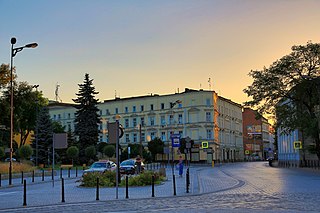
Gliwice(listen) is a city in Upper Silesia, in southern Poland. The city is located in the Silesian Highlands, on the Kłodnica river. It lies approximately 25 km west from Katowice, regional capital of the Silesian Voivodeship.

Upper Silesia is the southeastern part of the historical and geographical region of Silesia, located mostly in Poland, with small parts in the Czech Republic.
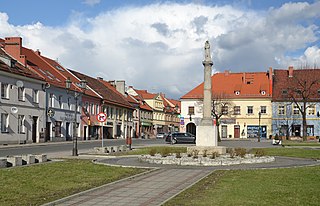
Pyskowice(listen) is a town in Silesia in southern Poland, near Katowice. Borders on the Upper Silesian Metropolitan Union – metropolis with the population of 2 million. Located in the Silesian Highlands.

Piekary Śląskie is a city in Silesia in southern Poland, near Katowice. The north district of the Upper Silesian Metropolitan Union – metropolis with the population of 2 million. Located in the Silesian Highlands, on the Brynica river.

The Silesian Uprisings were a series of three uprisings from August 1919 to July 1921 in Upper Silesia, which was part of the Weimar Republic at the time. Ethnic Polish separatists, seeking to have the area transferred to the newly founded Polish Republic, fought German police and paramilitary forces, as the former sought to keep the area part of the new German state founded after World War I. Following the conflict, the area was divided between the two countries. The rebellions have subsequently been commemorated in modern Poland as an example of Polish nationalism.
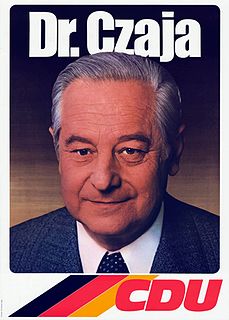
Herbert Czaja was a German Christian democratic politician. Czaja was born to a multi-ethnic and multilingual family in Cieszyn in Poland, which was part of Austria-Hungary at the time of his birth. During the Second Polish Republic he was politically active in the German Christian People's Party, a centrist party representing German-speaking Catholics in Poland, and obtained a doctorate in philology from the Jagiellonian University. In 1946 he was expelled from his native Poland by the communist regime during the expulsion of Germans after World War II and came as a refugee to Stuttgart in West Germany, where he worked as a teacher and became active in politics for the Christian Democratic Union.
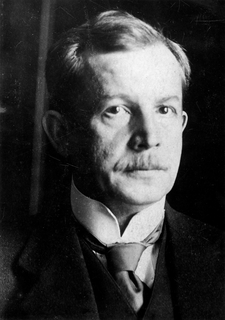
Wojciech Korfanty was a German and Polish activist, journalist and politician, who served as a member of the German parliaments, the Reichstag and the Prussian Landtag, and later, in the Polish Sejm. Briefly, he also was a paramilitary leader, known for organizing the Polish Silesian Uprisings in Upper Silesia, which after World War I was contested by Germany and Poland. Korfanty fought to protect Poles from discrimination and the policies of Germanisation in Upper Silesia before the war and sought to join Silesia to Poland after Poland regained its independence.

The Silesian Voivodeship was an autonomous province (voivodeship) of the interwar Second Polish Republic. The bulk of its territory had formerly belonged to the German/Prussian Province of Silesia and became part of the newly reborn Poland as a result of the 1921 Upper Silesia plebiscite, the Geneva Conventions, three Upper Silesian Uprisings, and the eventual partition of Upper Silesia between Poland, Germany and Czechoslovakia. The remainder had been the easternmost portion of Austrian Silesia which was partitioned between Poland and Czechoslovakia following the collapse of Austria-Hungary, the Polish–Czechoslovak War and the Spa Conference of 1920. The capital of the voivodeship was Katowice.

The Silesian Autonomy Movement, abbreviated as RAŚ, is a movement officially declaring its support for the autonomy of Silesia as part of a unified Europe. The association was founded in January 1990 by Rudolf Kołodziejczyk and is based in the Polish part of Upper Silesia. RAŚ sees the Silesians as a "separate nation" rather than primarily as Poles, Germans or Czechs.

Adolf Bertram was archbishop of Breslau and a cardinal of the Roman Catholic Church.

Jerzy Jan Antoni Ziętek was a Polish politician and general. A Silesian Insurrectionist in his youth, during the Second World War he joined the Polish armed forces in the USSR and later became an important politician representing Silesia in the People's Republic of Poland.
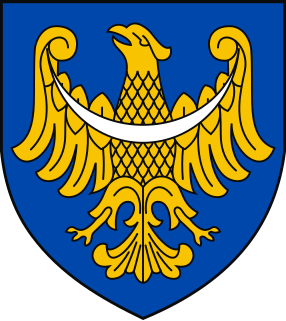
Silesian Parliament or Silesian Sejm was the governing body of the Silesian Voivodeship (1920–1939), an autonomous voivodeship of the Second Polish Republic between 1920 and 1945. It was elected in democratic elections and had certain influence over the usage of taxes collected in Silesia. It consisted of 48 deputies.

Gustaw Morcinek was a Polish writer, educator and later member of Sejm from 1952 to 1957. He is considered one of the most important writers from Silesia.
Eduard Pant was a journalist and politician of the Catholic German minority in the Silesian Voivodeship of Poland in the interwar period. He was Deputy Speaker of the Silesian Parliament from 1922 to 1935 and a Senator of the Second Polish Republic from 1928 to 1935.
The German Christian People's Party, originally the Catholic People's Party and the German Catholic People's Party was a Christian political party of the German minority in the Second Polish Republic. It had its stronghold in Upper Silesia and was represented in the Silesian Parliament, the Senate of Poland and other legislatives.

The Union of Upper Silesians was an early 20th-century movement for the independence of Upper Silesia. The movement had its genesis during the revolutions of 1848. Allied with the Silesian People's Party, it dissolved in 1924 but has influenced the present-day Silesian Autonomy Movement.
The Silesian People’s Party was a political organization in Cieszyn Silesia that existed from 1909 to 1938 in Austrian Silesia, which later became international plebiscite territory and finally part of Czechoslovakia. The party included mainly Slavic people, who saw themselves as members of a Silesian nation. The party is seen as part of the Szlonzakian movement or Silesian Separatist Movement.

Franciszek Fesser (born 16 August 1885 in Rogi, died 23 October 1956 in Piotrowice, was a Polish miner, union activist, Upper Silesian politician, insurgent, and deputy of the Silesian Parliament from 1930-1939.